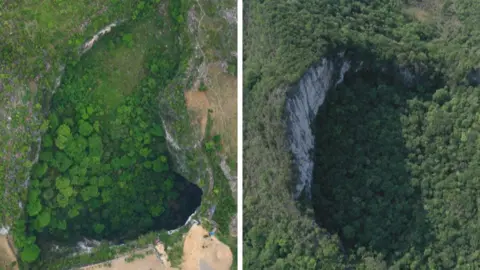 Xiqing Wang/BBC
Xiqing Wang/BBC
The couple stands on the edge of the sheer limestone cliff.
More than 100 meters (328 feet) beneath them is a lost world of ancient forests, plants, and animals. All they can see are leafy treetops, and all they can hear are the echoes of cicadas and birds bouncing off the cliffs.
For thousands of years, this “heavenly pit,” or “tiankeng” in Mandarin, was unexplored.
People feared demons and ghosts hiding in the mists, which swirled up from the depths.
But drones and a few brave souls who lowered themselves into places untouched since dinosaurs roamed the Earth have revealed new treasures—and turned China’s sinkholes into a tourist attraction.
Two-thirds of the world’s more than 300 sinkholes are in China, scattered throughout the country’s west—with 30 known tiankeng, Guangxi province in the south has more of them than anywhere else. Its biggest and most recent find was two years ago: an ancient forest with trees reaching as high as 40m (130ft). These cavities in the earth trap time, preserving unique, delicate ecosystems for centuries. Their discovery, however, has begun to draw tourists and developers, raising fears that these incredible, rare finds could be lost forever.
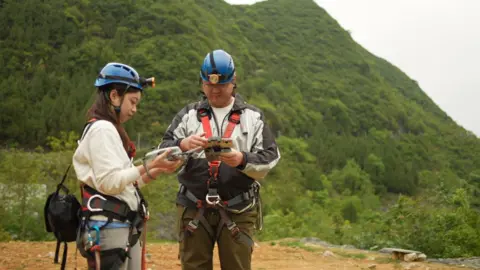 Xiqing Wang/BBC
Xiqing Wang/BBCOff the cliff
“I’ve never done this kind of thing before,” says 25-year-old Rui, looking down into the chasm. “It’s very cool. It will be the first time but not the last time.”
She takes a big breath. Then she and her boyfriend step back—off the edge and into the air.
Fei Ge—the man who had just meticulously checked Rui and Michael’s harnesses before sending them over the cliff—knows better than most the feeling of stepping back over the edge.
He was one of the first explorers. Now in his 50s, he works as a tour guide, helping people discover the secrets of Guangxi’s sinkholes.
Growing up in a village nearby, Fe had been told to stay away. “We thought that if humans went into the sinkholes, demons would bring strong winds and heavy rain. We thought ghosts brought the mist and fog.”
Fei Ge—or Brother Fei, as he is known—was taught that these sinkholes have their own microclimate. The wind rushes through the tunnels, and evaporated water from rivers inside the caves produces the mist.
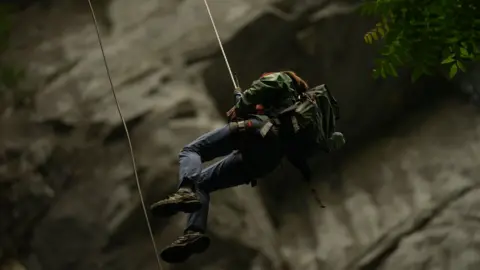 Xiqing Wang/BBC
Xiqing Wang/BBC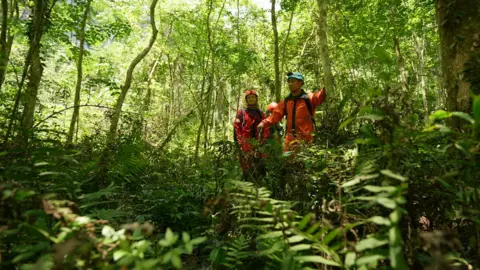 Xiqing Wang/BBC
Xiqing Wang/BBCEventually Brother Fei’s curiosity won, and he found a way into a sinkhole as a child.
“Every tiny stone caused loud noises and echoes,” he said. There was wind, rain, and even “mini tornadoes,” he recalled. “At first, we were afraid.”
But he kept exploring. It was only when he brought scientists to the site that he realised how unique the sinkholes were.
“The experts were astonished. They found new plants and told us they’ve been doing research for decades and never seen these species. They were very excited. We couldn’t believe that something we had taken for granted nearby was such a treasure.”
As scientists published their finds in journals and word spread of their discovery, others came to study the sinkholes. Fei says explorers from the UK, France, and Germany have come in the last 10 years.
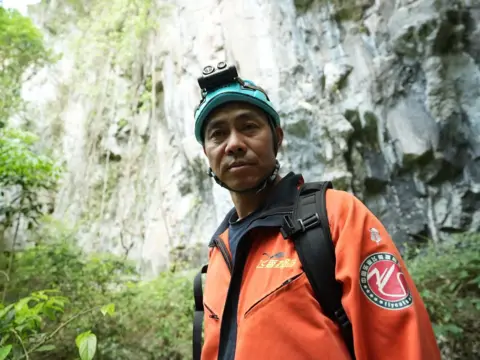 Xiqing Wang/BBC
Xiqing Wang/BBCSinkholes are rare. China—and Guangxi particularly—has so many because of the abundance of limestone. When an underground river slowly dissolves the surrounding limestone rock, it creates a cave that expands upwards towards the ground.
Eventually, the ground collapses, leaving a yawning hole. Its depth and width must measure at least 100 m for it to qualify as a sinkhole. Some, like the one found in Guangxi in 2022, are much bigger, stretching 300 m into the earth and 150 m wide.
For scientists, these cavernous pits are a journey back in time to a place where they can study animals and plants they had thought extinct. They have also found species they had never seen or known, including types of wild orchids, ghostly white cave fish, and various spiders and snails.
Protected by sheer cliffs, jagged mountains, and limestone caves, these plants and animals have thrived deep in the earth.
Into the cave
There is a delighted shriek as Rui dangles mid-air before she starts rappelling down.
This is just the start of the adventure for her and Michael. They have more ropework to do in the belly of the cave.
After a short walk through a maze of stalactites, Michael is lowered into the dark. The guides sweep the area with torches, illuminating the arc above us—a network of caves—and then shine the light into the narrow passages below, where a river once carved through the rock.
That’s where we are headed. The guides have to work hard to move the ropes into position.
“I am not a person that does much exercise,” says Michael, his words echoing in the cave.
This is the highlight of the Shanghai couple’s two-week break in Guangxi, the kind of holiday they had craved during China’s long COVID lockdowns. “This kind of tourism is more and more familiar on the Chinese internet,” he says. “We saw it and thought it looked pretty cool. That’s why we wanted to try it.”
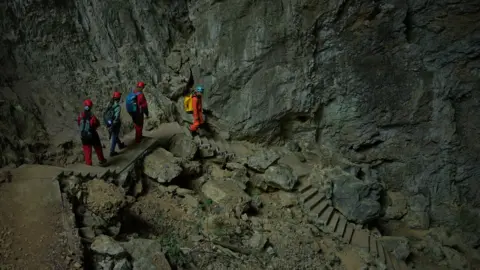 Xiqing Wang/ BBC
Xiqing Wang/ BBCVideos of the Guangxi sinkholes have gone viral on social media. What is a fun and daring feat for young people is a source of much-needed revenue in a province that was only recently lifted out of poverty.
There is little farmland in Guangxi’s unusual but stunning terrain, and its mountainous borders make trade with the rest of China and neighbouring Vietnam difficult.
Still, people come for the views. Pristine rivers and the soaring karst peaks of Guilin and Yangshuo in the north draw more than a million Chinese tourists each year. Photographs of mist-covered Guangxi have even made it onto the 20-yuan note.
Yet few have heard of Ping’e village, the nearest settlement to the sinkholes. But that is changing.
Brother Fei says a steady stream of visitors is changing fortunes for some in Ping’e. “It used to be very poor. We started developing tourism, and it brought lots of benefits. Like when the highways were built. We were really happy knowing we have something so valuable here.”
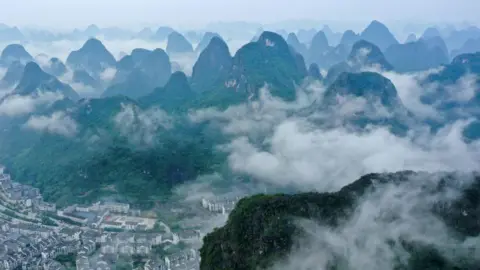
But there are concerns that tourism revenue could override the demands of scientific research.
About 50km from Ping’e, developers have built what they say is the highest viewing platform, which overlooks Dashiwei, the second-deepest sinkhole in the world. Tourists can peer 500 meters down into this particular “heavenly pit.”.
“We should better protect such habitats,” says Dr. Lina Shen, a leading sinkhole researcher based in China. “Sinkholes are paradises for many rare and endangered plant species. We are continuing to make new discoveries.”
By studying sinkholes, scientists also hope to find out how the Earth has changed over tens of thousands of years and better understand the impact of climate change. At least one sinkhole in Guangxi has already been closed to tourists to protect unique orchid varieties.
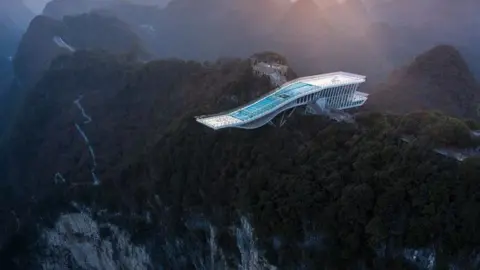 Bowen Hou @AUPH
Bowen Hou @AUPH“Overdevelopment could cause tremendous damage. We should maintain their original ecological state,” Dr. Shen says, adding that the solution lies in striking a balance.
“Hot air balloons, drones for aerial photography, and appropriate pathways for observation from a distance could allow tourists to closely yet remotely view sinkholes while disturbing as few organisms as possible.”
Brother Fei doesn’t disagree and insists there are “clear rules” to protect the sinkholes and what they hold. To him, they are a prized find that has changed his life. He is now one of Guangxi’s most qualified climbers and a renowned guide for both tourists and scientists, which has made him “very happy.”.
As we walk through acres of lush forest inside the sinkhole, he points to a cliff above us. He tells us to return when the rains do to see the waterfalls that pour down the side. It’s worth coming back for, he assures us.
Rui and Michael are being roped up as they encourage each other to abseil further into the cave. All that is visible beneath them is a narrow chasm, lit up by a torch. It’s all that remains of a riverbed, the catalyst in making this sinkhole.
“We need to balance this joy with protecting this place,” Michael says, looking around him.
He smiles as he is slowly lowered down and disappears into the cave.


